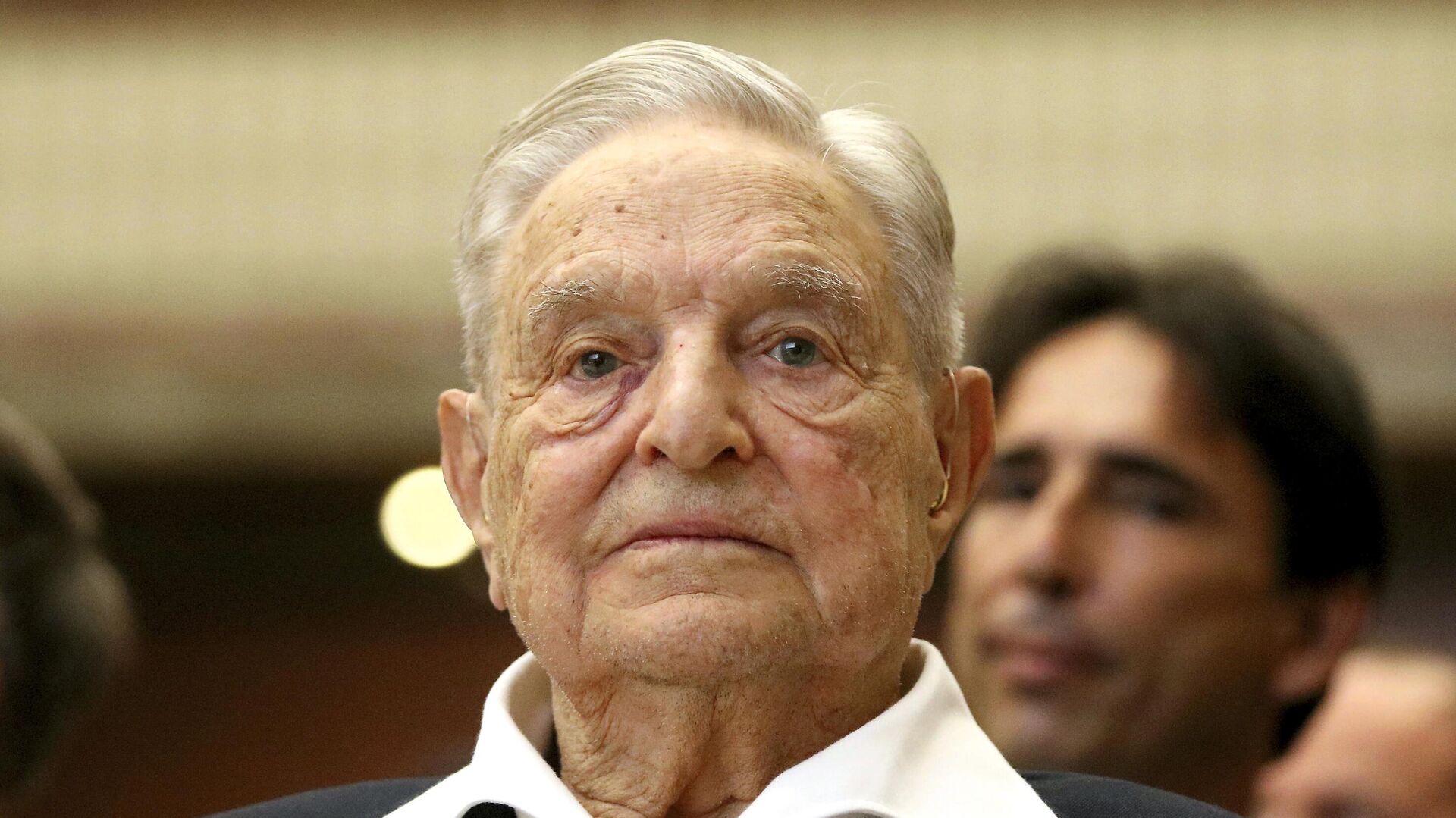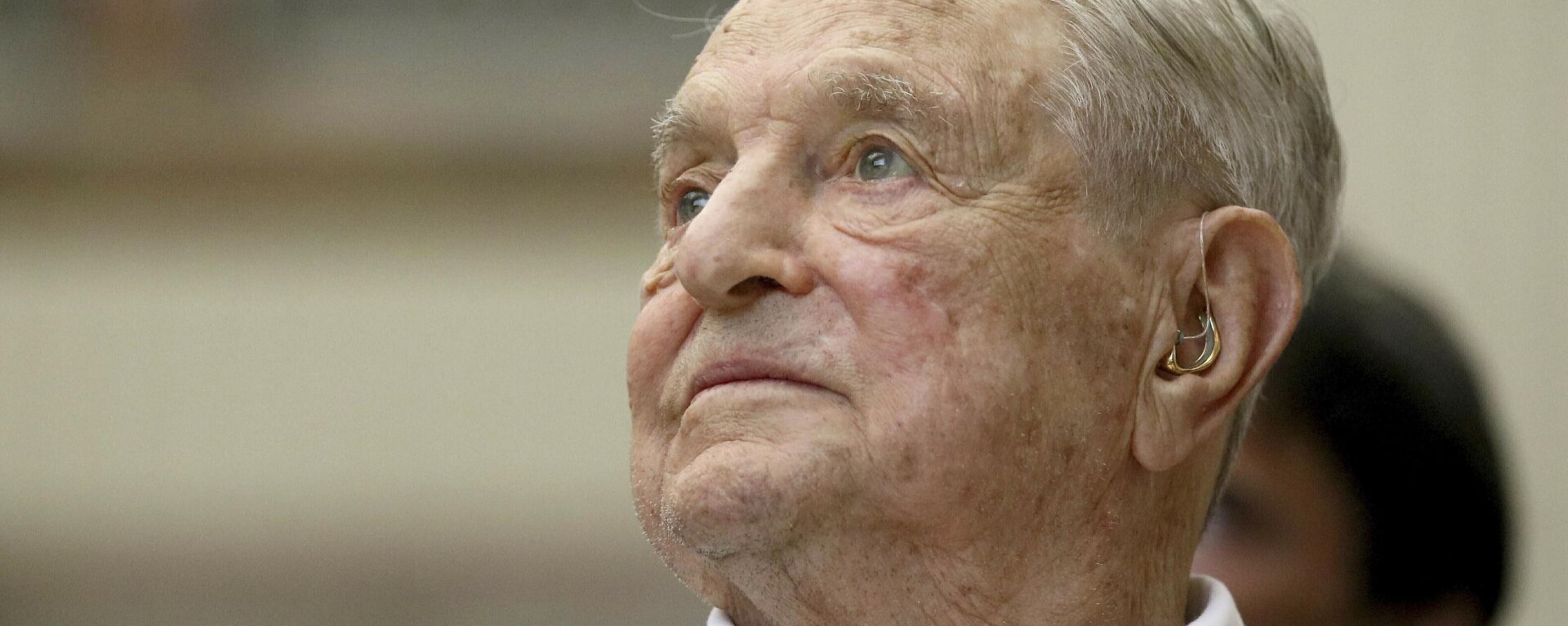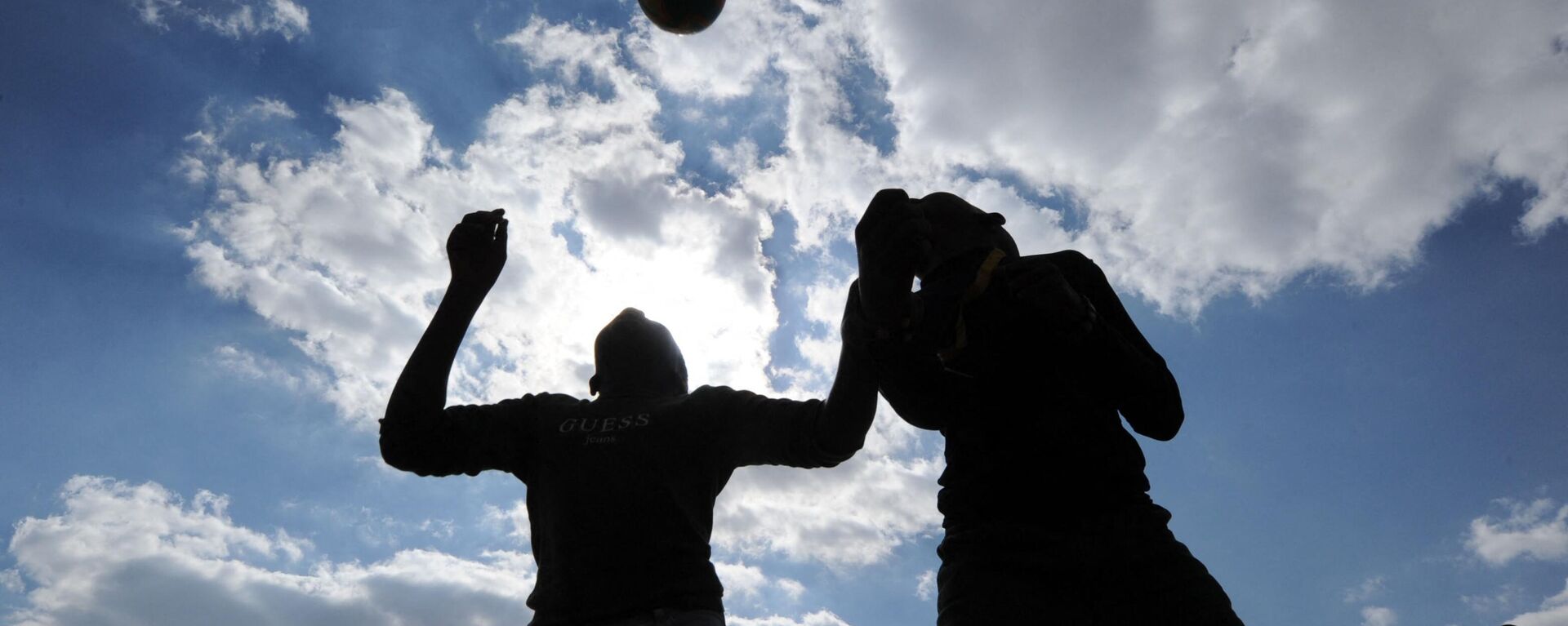https://en.sputniknews.africa/20230907/regime-change-vs-capital-market-openness-what-soros-osf-means-for-africa-1061948833.html
Regime Change vs. Capital Market Openness: What Soros' OSF Means for Africa?
Regime Change vs. Capital Market Openness: What Soros' OSF Means for Africa?
Sputnik Africa
Open Society Foundations' move into the Global South, including Africa, has raised many questions and concerns about its motives, methods, and impact. It has... 07.09.2023, Sputnik Africa
2023-09-07T19:20+0200
2023-09-07T19:20+0200
2023-09-07T19:43+0200
george soros
politics
charity
opinion
united states (us)
south africa
asia
european union (eu)
europe
african national congress (anc)
https://cdn1.img.sputniknews.africa/img/07e7/09/07/1061950633_0:15:2954:1676_1920x0_80_0_0_a40808cf23a444cca7611d0ff9143111.jpg
The Open Society Foundations (OSF), the grant-making network founded by Hungarian-born US billionaire George Soros, is reportedly planning to withdraw or end much of its work in the European Union as it shifts its focus and resources to other parts of the world, including Africa, Asia, and Latin America.The OSF said the decision comes amid a radical transformation to help the organization more effectively carry out its mission to promote "justice, democracy and human rights." However, the OSF has also faced criticism from some European governments and politicians, especially in Eastern Europe, for its support of liberal causes and civil society groups that challenge the status quo or the legitimacy of ruling authorities in attempts to change regimes.The OSF has a long history of being involved in African politics, working with numerous groups in Senegal, Kenya, and South Africa, among others. Soros's foundation has also supported the LGBT+ agenda, condemned the so-called Anti-homosexuality Act and Narcotic Drugs Control Act in Uganda, and funded media outlets and NGOs that promote its vision of open society.With the OSF expanding its activities in Africa, some experts have expressed their concerns about the potential threats and challenges that the infamous foundation could pose for African countries and societies.To shed the light in this topic, Sputnik Africa interviewed three experts who shared their views on the OSF’s move to the Global South.Dr. Phillip Dexter, an activist and chairman of the Armaments Corporation of South Africa (ARMSCOR), the arms procurement agency of the South African Department of Defense, described the OSF as a "Trojan horse" that carries out an agenda of the US government and its "covert side".He noted that the organization pushes these agendas without regard to the interests or values of the government and people of the country in which it operates.Dr. Dexter stressed that OSF's founder George Soros is an ideologue for neoliberalism and anti-communism, and that he has damaged economies globally through his hedge fund and investment activities. He also said that Soros's foundation has a regime change agenda in Africa, as it has done in other countries like Ukraine, Georgia, Macedonia, and Hungary.Dexter said that African leaders should be vigilant, challenge the OSF’s agenda, educate and inform their citizens, monitor them closely, and mobilize their people to defend their democracy.Dr. Roslyn Fuller, a Canadian-Irish author of “Beasts and Gods: How Democracy Changed Its Meaning and Lost Its Purpose”, told Sputnik Africa that she did not think that the OSF was promoting a Western liberal agenda, because if it were, it would not be spending so much money in Western countries as it has for many years.Fuller said that the OSF was mainly interested in keeping governments friendly and markets open for the interests of the "markets at the bottom." She told Sputnik Africa that while the OSF may mean well with its social justice goals, they are all part of the neoliberal package that may not result in increasing living standards for most people.The author accused the OSF of "taking divisive social issues that aren't necessarily the main political issues in any country and trying to turn them into the main political issues" in the host countries.Dr. Fuller added, "In some sense, unfortunately, because they push their agenda so hard and they make so many enemies, and because people feel that they're not getting the say, they're not getting a chance to debate, they're not being respected as citizens, it actually has the opposite effect to what they want and pushes people to disagree with them for the sake of feeling that you're standing up for your rights, and you're not going to be pushed around by this agenda."Meanwhile, Alex Krainer, an author and geopolitical analyst, founder of Monaco-based finance company Krainer Analytics, agreed with Dr. Phillip Dexter, saying that the Open Society Foundations are essentially a "Trojan horse of globalism."He said that in countries such as Serbia and Ukraine, the OSF have contributed to violent regime changes and have rightly become distrusted and unwelcome. He added that behind benevolent rhetoric there are always corrosive, nefarious actions, adding that Soros' hidden agendas are one of the examples.Krainer noted that with Alex Soros, George Soros’s son, being the foundation’s current chairman, probably nothing much will change in essence. He said that OSF exists for promotion of agendas that remain unchanged: hegemony and neocolonial exploitation. The analyst added that as in other nations, Open Society Foundation will pretend to do good, spread some money around and zero-in on issues that are sensitive and divisive.
https://en.sputniknews.africa/20230905/soros-foundation-reportedly-moves-its-activities-to-countries-of-global-south-1061902491.html
https://en.sputniknews.africa/20230712/us-charity-ijm-under-fire-for-alleged-harmful-actions-in-child-trafficking-cases-in-ghana-1060486853.html
united states (us)
south africa
asia
europe
Sputnik Africa
feedback@sputniknews.com
+74956456601
MIA „Rossiya Segodnya“
2023
Muhammad Nooh Osman
https://cdn1.img.sputniknews.africa/img/07e7/04/0a/1058467512_0:0:1280:1280_100x100_80_0_0_ec723833bcbfcaed2e21952965ad99e4.jpg
Muhammad Nooh Osman
https://cdn1.img.sputniknews.africa/img/07e7/04/0a/1058467512_0:0:1280:1280_100x100_80_0_0_ec723833bcbfcaed2e21952965ad99e4.jpg
News
en_EN
Sputnik Africa
feedback@sputniknews.com
+74956456601
MIA „Rossiya Segodnya“
Sputnik Africa
feedback@sputniknews.com
+74956456601
MIA „Rossiya Segodnya“
Muhammad Nooh Osman
https://cdn1.img.sputniknews.africa/img/07e7/04/0a/1058467512_0:0:1280:1280_100x100_80_0_0_ec723833bcbfcaed2e21952965ad99e4.jpg
george soros, politics, charity, united states (us), south africa, asia, european union (eu), europe, african national congress (anc)
george soros, politics, charity, united states (us), south africa, asia, european union (eu), europe, african national congress (anc)
Regime Change vs. Capital Market Openness: What Soros' OSF Means for Africa?
19:20 07.09.2023 (Updated: 19:43 07.09.2023) Muhammad Nooh Osman
Writer/Editor
Longread
Open Society Foundations' move into the Global South, including Africa, has raised many questions and concerns about its motives, methods, and impact. It has long been accused of being a tool for its founder's agenda, such as promoting liberal policies, often in opposition to the views and values of the host countries.
The Open Society Foundations (OSF), the grant-making network founded by Hungarian-born US billionaire George Soros, is reportedly planning to withdraw or end much of its work in the European Union as it shifts its focus and resources to other parts of the world, including Africa, Asia, and Latin America.
The OSF said the decision comes amid a radical transformation to help the organization more effectively carry out its mission to promote "justice, democracy and human rights." However, the OSF has also faced criticism from some European governments and politicians, especially in Eastern Europe, for its support of liberal causes and civil society groups that challenge the status quo or the legitimacy of ruling authorities in attempts to change regimes.
The OSF has a long history of being involved in African politics, working with numerous groups in Senegal, Kenya, and South Africa, among others. Soros's foundation has also
supported the LGBT+ agenda, condemned the so-called Anti-homosexuality Act and Narcotic Drugs Control Act in Uganda, and funded media outlets and NGOs that promote its vision of open society.
With the OSF expanding its activities in Africa, some experts have expressed their concerns about the potential threats and challenges that the infamous foundation could pose for African countries and societies.
To shed the light in this topic, Sputnik Africa interviewed three experts who shared their views on the OSF’s move to the Global South.
Dr. Phillip Dexter, an activist and chairman of the Armaments Corporation of South Africa (ARMSCOR), the arms procurement agency of the South African Department of Defense, described the OSF as a "Trojan horse" that carries out an agenda of the US government and its "covert side".
"We've long known that the Soros Foundation, as we've seen it, is a front," Dexter told Sputnik Africa. "It's an NGO, funded like that, but it's co-funded in many of its programs by the [US] National Endowment for Democracy and various other sources of funds. And essentially they push a liberal agenda and their idea is to try and transform all countries into essentially copies of the USA."
He noted that the organization pushes these agendas without regard to the interests or values of the government and people of the country in which it operates.
Dr. Dexter stressed that OSF's founder George Soros is an ideologue for neoliberalism and anti-communism, and that he has damaged economies globally through his hedge fund and investment activities. He also said that Soros's foundation has a regime change agenda in Africa, as it has done in other countries like Ukraine, Georgia, Macedonia, and Hungary.
"Well, what they do is they run training programs that build organizations, NGOs that then challenge the government. And the main focus of these organizations is regime change at the end of the day. They want to get rid of, for example, in South Africa, the ANC, and replace it with a liberal-democratic or even neoliberal government. And I think we've seen that in various African countries, but there's also a big pushback in Africa, as you've seen particularly and francophone Africa," the South African expert said.
Dexter said that African leaders should be vigilant, challenge the OSF’s
agenda, educate and inform their citizens, monitor them closely, and mobilize their people to defend their democracy.
"I think we must actually monitor them very closely and make sure that we don't allow them to get away with the kind of excesses that they do. Because, you see they have what we call soft regime change agendas, the one with the media, the press, NGOs and that. But all the time they're also preparing for what you call hard regime change, which, in the end, they will actually mobilize people to overthrow the government, as we saw the so-called, the orange revolutions in Eastern Europe and that type of thing," he cautioned.
Dr. Roslyn Fuller, a Canadian-Irish author of “Beasts and Gods: How Democracy Changed Its Meaning and Lost Its Purpose”, told Sputnik Africa that she did not think that the OSF was promoting a Western liberal agenda, because if it were, it would not be spending so much money in Western countries as it has for many years.
Fuller said that the OSF was mainly interested in keeping governments friendly and markets open for the interests of the "markets at the bottom."
"Their goal is usually governance. And you'll find this language a lot in Open Society Foundation documents. They'll talk a lot about governance, not government. So it's about creating what they view as a stable situation, mainly for markets at the bottom," explained Fuller, who is the director of the non-profit think tank, the Solonian Democracy Institute.
She told Sputnik Africa that while the OSF may mean well with its social justice goals, they are all part of the neoliberal package that may not result in increasing living standards for most people.
The author accused the OSF of "taking divisive social issues that aren't necessarily the main political issues in any country and trying to turn them into the main political issues" in the host countries.
"So I think what you could see in Africa is possibly a repeat of Eastern Europe, where, as we know, Soros and the Open Society Foundations have involved themselves for many years trying to push those societies to be very, very liberal, which has resulted in a lot of cases of those societies becoming less liberal," she said.
Dr. Fuller added, "In some sense, unfortunately, because they push their agenda so hard and they make so many enemies, and because people feel that they're not getting the say, they're not getting a chance to debate, they're not being respected as citizens, it actually has the opposite effect to what they want and pushes people to disagree with them for the sake of feeling that you're standing up for your rights, and you're not going to be pushed around by this agenda."
"A problem for Africa is that development requires a certain level of social services [...] I think it's going to be very hard for African countries to develop with any semblance of equality without those social services in place," she noted. "And of course, a lot of these non-profits and especially the OSF, don't really believe in that kind of thing because they believe in radical free markets."
Meanwhile, Alex Krainer, an author and geopolitical analyst, founder of Monaco-based finance company Krainer Analytics, agreed with Dr. Phillip Dexter, saying that the Open Society Foundations are essentially a "Trojan horse of globalism."
"While they profess seemingly laudable goals and principles that seem attractive and desirable to many people, values like education, freedom of expression, environment, social justice; in practice, Open Society Foundations always end up having a divisive influence in society and often participate in destabilizing activities," said Krainer, who grew up in former Yugoslavia where OSF was active before and during the wars of succession in the early 1990s.
He said that in countries such as Serbia and Ukraine, the OSF have contributed to violent regime changes and have rightly become distrusted and unwelcome. He added that behind benevolent rhetoric there are always corrosive, nefarious actions, adding that Soros' hidden agendas are one of the examples.
"Open Society Foundations always latches onto progressive sounding agendas, ostensibly to help those who are disadvantaged and marginalized. It's a good way to attract well-meaning, smart and creative people and to harness their energy and their passion. But as they say, the road to hell is paved with good intentions. In the end, all that passion gets diverted to Open Society Foundations' ultimate agendas, which are aligned with the interests of the Western occult oligarchy," the Monacan expert told Sputnik Africa.
Krainer noted that with Alex Soros, George Soros’s son, being the foundation’s current chairman, probably nothing much will change in essence.
He said that OSF exists for promotion of agendas that remain unchanged: hegemony and
neocolonial exploitation. The analyst added that as in other nations, Open Society Foundation will pretend to do good, spread some money around and zero-in on issues that are sensitive and divisive.
"At critical junctures, as everywhere else, they will play a destructive role. There is a reason why Open Society Foundations have become as unpopular in all nations in which they've operated for decades and why their activities now elicit resistance and distrust," Krainer concluded.




